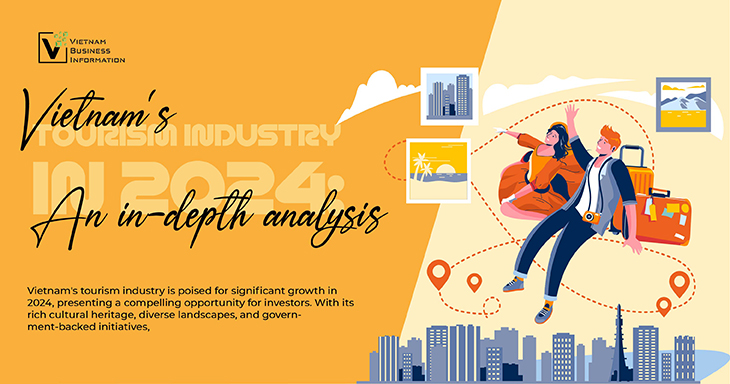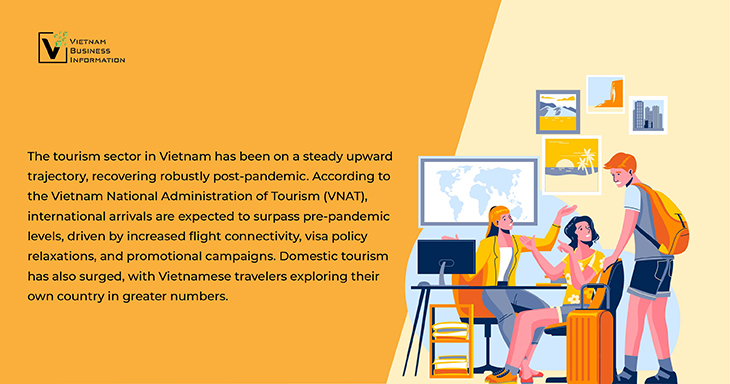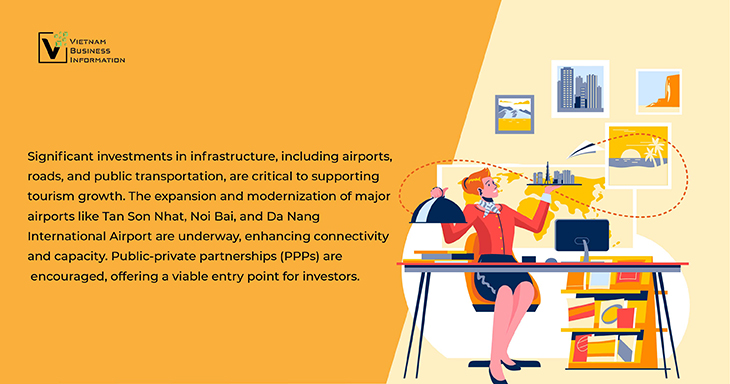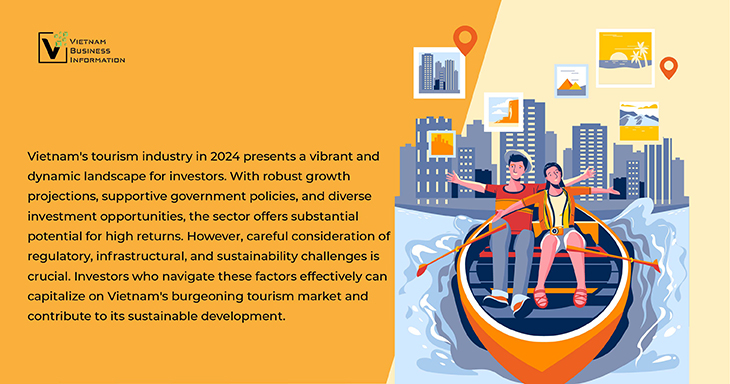Published Jun 2024
Vietnam's tourism industry in 2024: An in-depth analysis
Vietnam's tourism industry is poised for significant growth in 2024, presenting a compelling opportunity for investors. With its rich cultural heritage, diverse landscapes, and government-backed initiatives, Vietnam is rapidly transforming into a premier destination for global travelers.

This article provides an insightful overview for potential investors, examining the key factors that make Vietnam an attractive investment destination, emerging opportunities, and the challenges to consider.
Market overview
The tourism sector in Vietnam has been on a steady upward trajectory, recovering robustly post-pandemic. According to the Vietnam National Administration of Tourism (VNAT), international arrivals are expected to surpass pre-pandemic levels, driven by increased flight connectivity, visa policy relaxations, and promotional campaigns. Domestic tourism has also surged, with Vietnamese travelers exploring their own country in greater numbers.

Tourism significantly contributes to Vietnam's GDP, accounting for approximately 10% pre-pandemic. The government aims to increase this share by investing in infrastructure, enhancing tourism services, and promoting Vietnam as a safe and attractive destination. This focus on tourism as a strategic economic sector underscores its potential for sustained growth and profitability.
Key investment opportunities
1. Hospitality sector
The demand for hotels, resorts, and other accommodation facilities is rising, driven by the influx of international tourists and a burgeoning middle class in Vietnam. High-end and luxury segments, as well as mid-range and budget options, present lucrative opportunities. Coastal areas and major cities are prime locations for new developments, with ongoing projects promising high returns.
2. Infrastructure development
Significant investments in infrastructure, including airports, roads, and public transportation, are critical to supporting tourism growth. The expansion and modernization of major airports like Tan Son Nhat, Noi Bai, and Da Nang International Airport are underway, enhancing connectivity and capacity. Public-private partnerships (PPPs) are encouraged, offering a viable entry point for investors.

3. Eco and sustainable tourism
Sustainable tourism is a growing trend, with increasing demand for eco-friendly and socially responsible travel experiences. Investments in eco-resorts, sustainable tour operations, and conservation projects are gaining traction. Government policies favoring environmental protection and community-based tourism provide additional support for investors in this sector.
4. Cultural and heritage tourism
Vietnam’s rich cultural heritage and historical sites offer opportunities for developing heritage hotels, cultural tours, and museums. Restoration and conservation projects, often in collaboration with international organizations, can attract funding and provide long-term returns while preserving Vietnam’s unique cultural identity.
5. Technology and Innovation
Digital transformation in the tourism industry is opening up new avenues for investment. Online travel agencies (OTAs), booking platforms, and travel apps are experiencing rapid growth. Technology solutions that enhance the tourist experience, such as virtual reality tours, AI-driven customer service, and data analytics for personalized travel planning, are areas ripe for investment.

Government initiatives and support
The Vietnamese government has implemented various policies and incentives to attract investment in the tourism sector. These include tax incentives, land lease preferences, and simplified administrative procedures. Special economic zones (SEZs) and tourism-focused economic zones offer further benefits to investors.
National and international marketing campaigns, such as "Vietnam: Timeless Charm," are boosting the country’s tourism profile. Collaborative efforts with neighboring countries and participation in global tourism fairs enhance Vietnam's visibility as a travel destination.
The government actively promotes PPPs to develop tourism infrastructure and services. These partnerships provide a structured framework for investors to engage in large-scale projects with reduced risks and shared responsibilities.
Challenges and considerations
While the government is supportive, navigating the regulatory landscape in Vietnam can be complex. Investors need to stay informed about local laws, investment regulations, and compliance requirements to avoid potential pitfalls.
Despite improvements, infrastructure gaps remain, particularly in rural and remote areas. Investors must consider the logistical challenges and potential costs associated with developing projects in these regions.
As the focus on sustainability grows, investors must prioritize eco-friendly practices and corporate social responsibility. Failure to adhere to environmental regulations and community expectations can result in reputational damage and financial penalties.
The increasing popularity of Vietnam as a tourist destination is attracting numerous players, leading to heightened competition. Investors need to differentiate their offerings and focus on quality and innovation to stand out in the market.

Vietnam's tourism industry in 2024 presents a vibrant and dynamic landscape for investors. With robust growth projections, supportive government policies, and diverse investment opportunities, the sector offers substantial potential for high returns. However, careful consideration of regulatory, infrastructural, and sustainability challenges is crucial. Investors who navigate these factors effectively can capitalize on Vietnam's burgeoning tourism market and contribute to its sustainable development.















